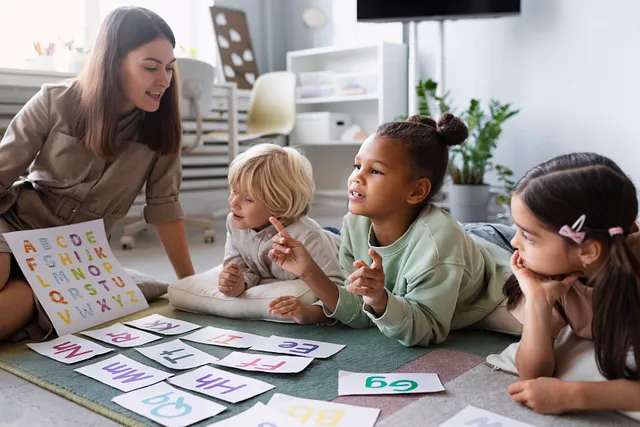
The Montessori method nurturers a love of learning in children through hands-on experiences and independent activities. For aspiring educators, embarking on teacher training in this unique pedagogy offers a fulfilling journey. Through rigorous programs, individuals gain a deep understanding of Montessori principles and learn to implement them effectively in the classroom.
- Key components of Montessori training often include observing experienced teachers, participating in practical workshops, and analyzing child development theories.
- Aspiring Montessori educators sharpen their skills in creating a prepared environment that supports children's natural curiosity and growth.
- Furthermore, training programs stress the importance of observing individual children, personalizing lessons to their needs, and fostering a collaborative learning community.
Concurrently, Montessori teacher training equips educators with the knowledge and competencies to create joyful and enriching learning experiences that empower children to reach their full potential.
Unlocking Potential: Montessori Teacher Education and Development
A compelling journey into the world of Montessori education begins with a dedicated teacher program. Teachers are at the heart of the Montessori philosophy, guiding young minds to thrive through self-directed learning and exploration. Professional development opportunities allow Montessori educators to deepen their understanding. This ongoing journey fosters a passionate community of teachers who are passionate to nurturing the full potential of every child. Through collaborative communities, sharing best practices and innovative strategies becomes a vital element in the evolution of Montessori teacher education.
Venture into Montessori: Exploring Teacher Certification Pathways
Are you passionate about the innovative and nurturing approach of Montessori education? Do you dream of nurturing young minds in a engaging learning environment? If so, embarking on a Montessori teacher certification journey may be your ideal path. This article will shed light on the diverse routes available to you, helping you navigate the best fit for your aspirations.
The first step is exploring the fundamental principles of Montessori pedagogy. Delve into its philosophy of child-centered learning, where independent exploration and hands-on activities hold significance. There are numerous resources available, including books, to provide a solid foundation in Montessori theory.
- Accreditation is crucial when selecting a teacher training program. Look for programs endorsed by reputable Montessori organizations such as AMI or MACTE.
- Evaluate your learning style and preferences. Some programs offer traditional classroom settings to cater different learners.
- Connecting with other Montessori educators is invaluable. Attend conferences, join professional organizations, and engage with online communities to expand your knowledge base
Finally, remember that the journey of becoming a Montessori teacher is a lifelong passion. Celebrate ongoing professional development opportunities and strive for continuous growth to excel in this rewarding field.
Nurturing Young Minds: The Foundations of Montessori Teacher Training
Embarking on the journey of becoming a Montessori educator requires a deep understanding of the developmental principles that underpin the Montessori method. A comprehensive teacher training program provides aspiring teachers with the knowledge necessary to create a nurturing and stimulating environment where children can grow. Through experiential learning, trainees engage in activities that reflect Montessori practices, developing their talent to guide children's exploration and nurture their independence.
- A robust training program will delve into the origins of Montessori education, exploring its fundamental principles and their impact in today's educational landscape.
- Trainees will also study the distinct features of a child's progression across various phases, gaining knowledge into how children learn best.
- Furthermore, training will equip educators with the strategies to create a well-organized classroom that facilitates children's participation in meaningful learning activities.
Stepping into a Montessori Educator: Curriculum, Philosophy, and Practice
Venturing upon the realm of Montessori education is a deeply fulfilling journey. At its core lies a profound philosophy in the innate ability of every child to develop at their own pace. Montessori educators foster an environment that encourages independent exploration and discovery, guided by carefully prepared resources.
The curriculum itself is a living tapestry, crafted to adjust to the evolving needs of each child. It integrates practical learning across a wide range of subjects, from mathematics and reading to science.
A Montessori educator is more than just a teacher; they are a mentor, respecting each child's uniqueness. They establish a supportive classroom community where children feel secure to explore and learn at their full potential.
Nurturing a Passion for Knowledge: The Art and Science of Montessori Teaching
In the vibrant world of Montessori education, learning transcends the confines of traditional classrooms. It becomes an engaging journey guided by a dedicated teacher who acts as a mentor. Montessori philosophy centers around the click here child's inherent need to learn, fostering independence, self-discovery, and a lifelong love of knowledge. Through carefully prepared environments and experiential activities, children are encouraged to explore their passions at their own pace. The teacher's role is crucial in assessing each child's development, offering gentle guidance and recognizing their achievements.
This integrated approach to education not only develops academic skills but also enhances social, emotional, and creative abilities. Through collaboration, children learn critical life skills such as problem-solving, communication, and tolerance.